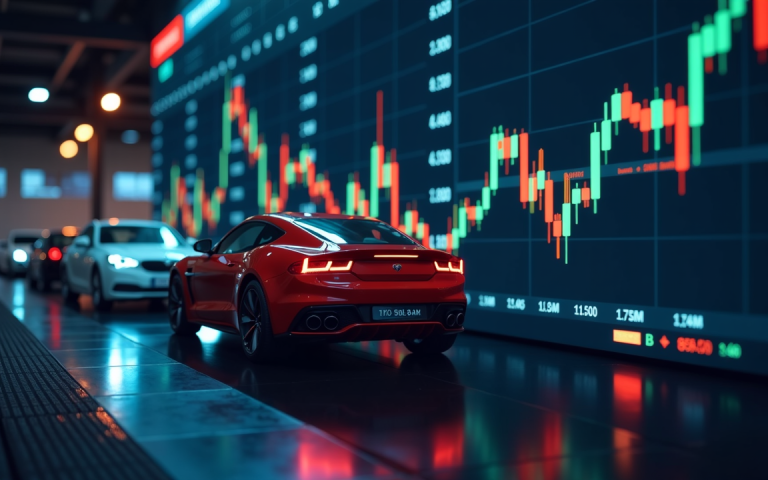Shares in several major European carmakers rose in early trading on Wednesday, catching a tailwind from a steep rally among their Asian rivals.
This wave of optimism was sparked by the news that Japan has struck a significant trade deal with the United States, a development that is now fueling hopes for a similar, much-needed agreement between Europe and Washington.
A ripple effect across the globe: auto stocks rally on tariff relief
The positive momentum for European auto stocks followed a surge in the shares of Japanese and South Korean automakers overnight.
This rally was a direct reaction to the news that the new US-Japan trade deal would cut the US tariff on Japanese vehicle imports to 15%, a significant reduction from a previously proposed 25%.
In response, shares of Porsche, BMW, Mercedes Benz, and Volkswagen rose between 1.9% and 3.7% in early Frankfurt trade. On the Tradegate platform, shares in Stellantis and Renault also saw gains, rising between 1.3% and 1.9%.
Analysts at Citi noted a particularly important detail of the US-Japan pact: the tariff for a major auto exporting country was reduced without a cap on the number of shipments.
This, they suggested, “could have implications for negotiations with the European Union and South Korea,” hinting that a precedent may have been set for a more favorable outcome for other auto-exporting nations.
The gross impact of the tariffs on Japanese automakers is now projected to be about ¥1.9 trillion with the rate at 15%, a significant downward revision from the previous estimate of around ¥3.5 trillion at a 25% tariff rate, according to a note from Goldman Sachs Japan Co. analyst Kota Yuzawa.
‘Open their country’: a familiar US demand resurfaces
President Donald Trump’s latest trade deal also included a familiar, though somewhat forgotten, demand for Japan to “open their country” to cars imported from the US.
This potentially breathes new life into a contentious issue that was a major point of friction between the two nations in the 1980s and 1990s.
For decades, U.S. automakers like Ford Motor Co. and General Motors Co. have sought to gain a significant foothold in the Japanese market, but their sales numbers there remain minuscule.
The trade imbalance is stark: in 2024, Japan exported nearly 1.4 million cars to the U.S., but imported just about 16,000 US-built automobiles.
The long-standing arguments explaining the unpopularity of American cars in Japan are well-known: they have historically been seen as too fuel-inefficient, too large for Japan’s narrow roads, and not designed with domestic tastes in mind.
While US automakers have introduced models to address some of these criticisms, local car buyers have consistently shown a strong preference for German-made imports above others, a trend that is not likely to change soon.
“Past efforts have yielded limited success,” commented Bloomberg Intelligence senior auto analyst Tatsuo Yoshida.
However, as consumer preferences shifted toward minivans like the Japan-specific Odyssey and SUVs such as the first-generation CR-V, US-built imports gradually lost traction.
Japan’s concessions: streamlining certification and tapping dealerships
As part of the new trade pact announced on Wednesday, Japan has agreed to forgo additional safety tests for vehicles imported from the US, according to Ryosei Akazawa, the country’s top trade negotiator.
“This means Japan will streamline certification of US-made cars,” Akazawa said on Wednesday, while adding, “Ensuring public safety will of course be a prerequisite.”
This move aims to address one of the key hurdles that has historically made it costly and difficult to sell US cars in Japan.
In the 1990s, bilateral tensions had fueled a push to increase imports from the US, which even led some Japanese carmakers to “reverse import” cars that were manufactured or assembled in their North American plants back to Japan.
While those efforts helped to offset some of the trade imbalance, they never gained significant traction, with the differing vehicle safety regulations between the two nations proving to be a particularly costly obstacle.
To further support the import of US cars, the Japanese government is reportedly planning to tap the extensive dealership networks of its local automakers to sell American vehicles, Kyodo reported, citing an unidentified person.
The report also said that officials plan to urge Japanese automakers to export cars made in their US plants back to Japan.
The post US-Japan trade deal boosts European automaker stocks; Porsche, BMW gain appeared first on Invezz

